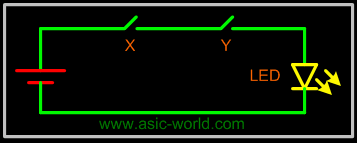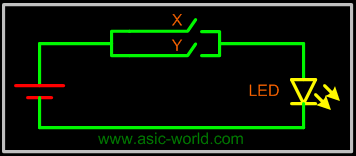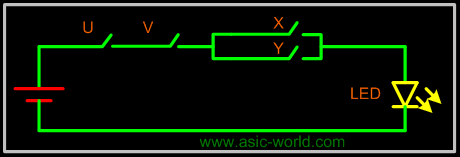|
|
| |
|

|
|
|
|
| |
|

|
| |
 |
Logic Circuits
|
| |
|

|
|
|
Boolean algebra is ideal for expressing the behavior of logic circuits. |
| |
|

|
|
|
A circuit can be expressed as a logic design and implemented as a collection of individual connected logic gates. |
| |
|

|
| |
 |
Fixed Logic Systems
|
|
|
A fixed logic system has two possible choices for representing true and false. |
| |
|

|
| |
 |
Positive Logic
|
|
|
In a positive logic system, a high voltage is used to represent logical true (1), and a low voltage for a logical false (0). |
| |
|

|
| |
 |
Negative Logic
|
|
|
In a negative logic system, a low voltage is used to represent logical true (1), and a high voltage for a logical false (0). |
| |
|

|
|
|
In positive logic circuits it is normal to use +5V for true and 0V for false. |
| |
|

|
|
|
|
| |
|

|
| |
 |
Switching Circuits
|
|
|
The abstract logic described previously can be implemented as an actual circuit. Switches are left open for logic 0 and closed for logic 1. |
| |
|

|
| |
 |
Two variable AND circuit X.Y
|
| |
|

|
|
|
 |
| |
|

|
| |
 |
Two variable OR circuit X + Y
|
| |
|

|
|
|
 |
| |
|

|
| |
 |
Four variable circuit U.V.(X + Y)
|
| |
|

|
|
|
 |
| |
|

|
| |
 |
Truth Table
|
|
|
A truth table is a means for describing how a logic circuit's output depends on the logic levels present at the circuit's inputs. |
| |
|

|
|
|
In the following twos-inputs logic circuit, the table lists all possible combinations of logic levels present at inputs X and Y along with the corresponding output level F. |
| |
|

|
|
|
 |
| |
|

|
|
|
|
X
|
Y
|
F = X*Y
|
|
0
|
0
|
0
|
|
0
|
1
|
0
|
|
1
|
0
|
0
|
|
1
|
1
|
1
|
|
| |
|

|
|
|
When either input X AND Y is 1, the output F is 1. Therefore the "?" in the box is an AND gate. |
| |
|

|
| |
|

|
| |
|

|
|
|
|
| |
|

|
|
|
|

|

|

|
|

|
|
Copyright © 1998-2025 |
Deepak Kumar Tala - All rights reserved |
|
Do you have any Comment? mail me at:deepak@asic-world.com
|
|